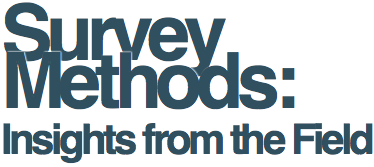Comparing Continuous and Dichotomous Scoring of Social Desirability Scales: Effects of Different Scoring Methods on the Reliability and Validity of the Winkler-Kroh-Spiess BIDR Short Scale
Survey researchers often include measures of social desirability in questionnaires. The Balanced Inventory of Desirable Responding (BIDR; Paulhus, 1991) is a widely used instrument that measures two components of socially desirable responding: self-deceptive enhancement (SDE) and impression management (IM). An open question is whether these scales should be scored dichotomously (counting only extreme values) or continuously (taking the mean of the answers). This paper compares the two methods with respect to test-retest reliability (stability) and internal consistency using a short German version of the BIDR (Winkler, Kroh, & Spiess, 2006). Tests of criterion validity are also presented. Data are taken …






